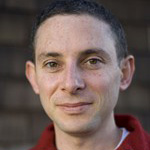
Ophir Klein, PhD, MD
Ophir Klein is Professor of Orofacial Sciences and Pediatrics, the Larry L. Hillblom Distinguished Professor in Craniofacial Anomalies, and the Charles J. Epstein Professor of Human Genetics at the University of California, San Francisco (UCSF). He serves as Chief of the Division of Medical Genetics, Chair of the Division of Craniofacial Anomalies, Interim Director of the Institute for Human Genetics, and Director of the Program in Craniofacial Biology.
The Klein laboratory focuses on understanding how organs form in developing embryos and how they regenerate in adults. When developmental and regenerative processes go awry, then birth defects, cancer and other diseases can result. The group's research is centered on understanding how development and regeneration normally occur in the hope of one day treating diseases that result from abnormalities in these processes.
A central focus in the lab is craniofacial and dental development, as malformations in these organs are among the most common congenital abnormalities and have profound impacts on the lives of patients and their families. The maintenance, repair and growth of many adult organs, such as the bone marrow, skin, brain, and gastrointestinal tract, depend on tissue-specific populations of stem cells. The lab uses the rodent incisor, which grows continuously throughout the life of the animal, as a model system to understand adult stem cells. We intend to use the insights provided by our experiments in mice to guide us in the use of stem cells in regenerating dental and craniofacial tissues as a paradigm for developing replacement organs.
Another major area of study is regeneration of the gastrointestinal tract. The amazing ability of the mammalian gastrointestinal epithelium to renew has long fascinated biologists. Our research aims to address fundamental questions in this field, including the identity, regulation and plasticity of intestinal stem cells.
Finally, the laboratory is interested in how positive and negative modulators of signaling affect development, homeostasis and cancer. We are studying the roles of these molecules in the patterning and outgrowth of teeth, taste papillae, the oral mucosa, and other tissues and organs.
